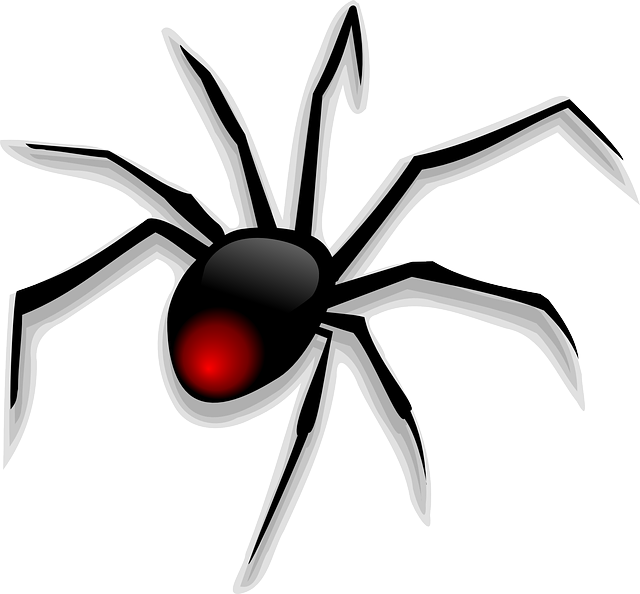Spider infestations can rapidly escalate, necessitating swift action. Effective prevention strategies involve understanding spider behaviors, focusing on quiet, dark spaces and areas with abundant prey like gardens and corners. Outdoor treatments combining organic repellents and targeted chemicals are potent deterrents, while professional services leverage eco-friendly methods for comprehensive protection. Regular inspections by experts are crucial for identifying entry points and high-activity areas in both residential and commercial settings, ensuring timely intervention through integrated pest management (IPM) practices to maintain a spider-free environment.
Tired of sharing your outdoor spaces with unwelcome eight-legged guests? Understanding and targeting spider behavior is the first step towards effective spider infestation prevention. This article equips you with comprehensive insights into managing and minimizing spider activity in both residential and commercial settings. From identifying common habitats to exploring professional spider control strategies, eco-friendly solutions, and practical spider-proofing measures, we offer a multi-faceted approach to keeping spiders at bay without compromising on safety or environmental friendliness. Discover proven tips for a spider-free haven today!
# Blog Post Outline: Targeted Outdoor Treatments to Minimize Spider Activity
Spider infestations can quickly turn from an annoyance to a serious problem, whether in your home or on commercial premises. Luckily, there are targeted outdoor treatments that can significantly minimize spider activity and prevent them from setting up camp in your space. Professional spider control services often employ eco-friendly solutions, combining organic repellents and strategic applications of safe chemicals to create an impenetrable barrier against arachnids.
Implementing these treatments requires a deep understanding of spider behavior and the unique needs of your property. Residential or commercial, regular inspections by pest control experts are key to identifying entry points and hotspots where spiders congregate. By spider-proofing your home or business with professional guidance, you can enjoy peace of mind, knowing that your space is safe from these eight-legged invaders.
<section id="understanding-spider-behavior-and-habitats“>
Understanding Spider Behavior and Habitats
Understanding the behavior and habitats of spiders is key to effective spider infestation prevention. Spiders are arachnids that thrive in quiet, dark spaces, often building webs in corners, attics, or crawl spaces. They primarily hunt insects but can multiply rapidly if left unchecked, leading to unsightly and potentially distressing infestations. Knowing their preferences helps in implementing targeted outdoor treatments to minimize spider activity.
Professional spider control services leverage eco-friendly solutions like sealing entry points, removing clutter, and using natural repellents. For residential and commercial spaces alike, these methods offer a safe and effective way to spider-proof your home or office. Regular inspections by experts can identify potential problem areas, ensuring timely intervention before spider populations escalate. Incorporating these spider prevention tips into your routine maintenance regimen will significantly reduce the risk of unwelcome arachnid visitors.
– Identifying common outdoor areas where spiders proliferate.
Spiders are often found in areas where their prey is abundant. Common outdoor spots that attract spiders include gardens, especially those with lush vegetation and tall grass; wooden decks and patios; garages and sheds; and any dark, undisturbed corners or crevices. These spaces provide ideal hiding places for spiders to build webs and capture insects, making them potential entry points into homes and businesses. Regularly maintaining these areas by trimming foliage, sweeping debris, and sealing off potential entry points can significantly reduce spider activity.
To prevent a spider infestation, consider implementing eco-friendly spider prevention solutions like using essential oils (e.g., citronella or peppermint) as natural repellents; keeping outdoor spaces well-lit to deter spiders attracted to darkness; and maintaining a clean environment by regularly removing webs and egg sacs. For more severe cases or commercial settings, professional spider control services offer specialized treatments that target spider habitats while ensuring safety for people and pets. Effective spider-proofing involves addressing entry points, sealing gaps around windows and doors, and using strategic placement of traps or sticky barriers to disrupt spider movement.
– Seasonal variations in spider activity and their preferences for specific environments.
Spiders are highly adaptable creatures, and their activity patterns often change with the seasons. During warmer months, spiders become more active as they hunt for food and mate, making spring and summer peak times for spider infestations. They prefer warm, humid environments, especially areas with abundant vegetation and woodpiles, which provide excellent hiding spots and food sources. In contrast, in colder regions, spiders tend to slow down their activity and may seek shelter indoors during winter, leading to increased indoor spider presence.
Understanding these seasonal variations is crucial for effective spider infestation prevention. Professional spider control services often tailor their strategies to these cycles, offering more proactive treatments during active seasons. For residential and commercial spaces alike, spider-proofing your home or building involves addressing entry points, maintaining proper ventilation, and reducing moisture levels—all essential spider prevention tips. Eco-friendly solutions, such as natural repellents and regular cleaning, can also significantly deter spiders without resorting to harsh chemicals.
In conclusion, a comprehensive approach to spider infestation prevention involves understanding their behavior and targeting specific habitats. By identifying common outdoor areas where spiders proliferate and implementing eco-friendly prevention tips, such as regular cleaning, sealing entry points, and using natural repellents, both residential and commercial spaces can effectively reduce spider activity. For severe or persistent issues, enlisting the help of professional spider control services ensures a thorough and lasting solution, making your environment safer and more comfortable.
